Thanks to those who pre-ordered some of the great forthcoming books we highlighted in the last BookNotes. As I wrote to many of you, it really does give us hope when folks buy books; it’s a reminder that there are those who want to learn, to grow, to deepen their discipleship, to serve God more fruitfully. Who still care about the printed page and about bookstores. Who look to us to help them out. That you appreciate our curation and order from our small town, independent, bricks-and-mortar family business is really appreciated. It matters to us a lot.
Those books were written by authors you most likely have heard of (and if you’ve read BookNotes before, I’m quite sure you have!) Some of the books are eagerly awaited; they’ve got that buzz going on. Sometimes, though, I want to give a quick shout-out to some authors you mostly haven’t heard of, or, in some cases, a well-known author who releases a new book that is published by a small or indie press that you may not know about.
We get unsolicited manuscripts and samples of self-published books all the time. I’m sorry to say that many are pretty poorly done. Even the covers and font and page design illustrate that they are sub-par. As they say down south, “Bless their hearts” for trying. Some are fine, but just very personal, or for a niche interest and not the sort of thing we can in good conscious recommend very widely.
Sometimes, though, there are small press or self-published titles that are really good, well crafted by thoughtful authors, books that we think we should amplify a bit. Here, then, are twelve new indie/self-published works we want to tell you about.
We show the regular retail price, but all are 20% OFF; we will deduct the discount for you. You can easily order them by using our secure order form page by clicking the link at the end of the column.
 Apparent Faith: What Fatherhood Taught Me About the Father’s Heart Karl Forehand (Quoir) $19.99 Karl is a new friend, a friend of some other friends, and a former pastor who now attends Brian Zahnd’s church in Missouri. Forehand’s story is gently told and it is, I think, a fairly common one, especially these days. He has shifted from a more legalistic and strict conservative faith to a more open and generous one. Memoirs of how folks have shifted in their faith journey are not uncommon and are often moving – think of Rachel Held Evans or Pete Enns, just for instance – and in a way, this is one of those sorts of stories of a traditionalist evangelical has refreshed his understanding of God.
Apparent Faith: What Fatherhood Taught Me About the Father’s Heart Karl Forehand (Quoir) $19.99 Karl is a new friend, a friend of some other friends, and a former pastor who now attends Brian Zahnd’s church in Missouri. Forehand’s story is gently told and it is, I think, a fairly common one, especially these days. He has shifted from a more legalistic and strict conservative faith to a more open and generous one. Memoirs of how folks have shifted in their faith journey are not uncommon and are often moving – think of Rachel Held Evans or Pete Enns, just for instance – and in a way, this is one of those sorts of stories of a traditionalist evangelical has refreshed his understanding of God.
Here’s what makes this different: Karl offers here less a diatribe against wrong-headed fundamentalism and rather tells a story of his life as a father. As a dad of adult children that I admire, I liked this a lot. In a quiet, non-nonsense way he wears his heart on his sleeve, telling how he raised his children (and how he and his wife are loving their grandchildren.) It may have been from Brian McLaren where I first heard this analogy, but Karl notes that surely God (who Jesus tells us to call Father and to relate to as a caring parents) is a better parent than we are. We forgive our kids when they screw up, we are patient, we try to understand their issues, we don’t make them grovel. Good parents are a signal of transcendence, as they say, a pointer, in some ways, to the goodness of God’s holy, royal, cosmic Parenthood. It is a commonplace that we form our view of God from our earthly parents. There are books that even explore that, how we think about our own parents and how (sometimes) that has given us bad views of God. I don’t think I know of any book like this, that explores a change in one’s view of God by pondering one’s own parenting.
Kudos to Karl Forehand for his own work as a leadership coach and faithful follower of Jesus. Thanks for sharing in plain prose how as a dad you see your family, your parenting, your faith. As Brian Zahnd says of the book “I call this the water to wine journey. Karl’s journey has not been without pain, but it has been beautiful.” Indeed.
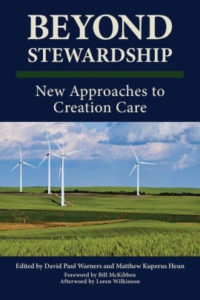 Beyond Stewardship: New Approaches to Creation Care edited by David Paul Warners & Matthew Kuperus Heun (Calvin College Press) $17.99 We stock everything of this small college press (including their marvelous, brief paperbacks in their “Calvin Shorts” series.) This is a major new work and might have been well-served by being shopped around to be released on a major, prestigious publisher because Beyond Stewardship is brilliant in its overall vision and wonderful in how it has offered so many interesting, astute, and vitally important contributions to the conversations about faith and what some call creation-care. This fascinating and generative book deserves a more careful review and I hope to do that, soon.
Beyond Stewardship: New Approaches to Creation Care edited by David Paul Warners & Matthew Kuperus Heun (Calvin College Press) $17.99 We stock everything of this small college press (including their marvelous, brief paperbacks in their “Calvin Shorts” series.) This is a major new work and might have been well-served by being shopped around to be released on a major, prestigious publisher because Beyond Stewardship is brilliant in its overall vision and wonderful in how it has offered so many interesting, astute, and vitally important contributions to the conversations about faith and what some call creation-care. This fascinating and generative book deserves a more careful review and I hope to do that, soon.
Here’s the basic gist: Beyond Stewardship is a collection of about 15 chapters offered by a wonderful crew of interdisciplinary scholars who invite us to think whether “stewardship” is the best way to describe humankind’s relationship with the other-than-human creation. For decades, theologians (especially those within the evangelical tradition who want to be intentionally shaped by the Bible) have drawn on the deep and rich notion of being house-holders, care-takers, managers and vice-regents of God’s good but fallen world. Stewardship, we often say, is more than giving money to church (as it has woefully been reduced to within the common church-goer’s imagination.) It is caring for resources and managing them well.
It doesn’t take too much thought or observation to realize the importance of asking if this is actually the best way to talk about what Genesis calls oikonomia, the home-making calling to tend and keep the economy of the garden. And it doesn’t take too much thought or consideration to see that it may not be fruitful to think of ourselves as “over” the other creatures, distant from, “using” them. This fine book from Calvin College Press is a tremendous and important conversation about that question.
Here are three quick things that might inspire you to order this from us. First, I’m happy to say that one of the authors in this book is one of our very best friends, Gail Gunst Heffner, who has for years, with other colleagues and students at Calvin College (now University) have been painstakingly and lovingly working to restore a deteriorating stream in their Grand Rapids area watershed. The “Plaster Creek Stewards” have gotten some national attention and their deep involvement helping the college use its resources to serve the community has helped many of them, Gail included, to increasingly doubt the ultimate usefulness of the “stewardship” model. (Gail, by the way, has a chapter in Beyond Stewardship on what is often called environmental racism and it is clear, succinct, tender, and prophetic.) Gail used to work for the Pittsburgh-based campus ministry organization. the CCO, and is truly beloved by so many. So – friends and alum of CCO and others who appreciate Gail’s friendship and work and witness – you should pick this up.
Secondly, Gail isn’t the only person in this book we admire. Steven Bouma-Prediger (who teaches at Hope College and has a forthcoming book, releasing in January 2020 called Earthkeeping and Character: Exploring a Christian Ecological Virtue Ethic) has a lovely piece I adored, making the overt case why we should “move from stewardship to earthkeeping.” James R. Skillen (son of the political scientist and neo-Calvinist author) uses his expertise in geology to get at the topic in light of the Biblical teaching of the Kingdom of God. There are other Calvin profs who have made vital contributions – English professor and wondrous writer Debra Rienstra has a chapter called “What’s That? Naming, Knowing, Delighting, Caring, Suffering” that is a great essay helping us to reorient our imagination and find hopeful ways forward. The piece “From Stewardship to Place-making and Place-Keeping” resonated with me a lot. Editor David Paul Warner’s has a beautiful chapter called “Walking Through a World of Gifts.”
There’s so much in here. There is an art piece, a delightful student contribution, excellent discussion questions and other creative touches. Contributors include the likes of Aminah Al-Attas Bradford, an ordained CRC minister and a PhD candidate at Duke; she is theologian who knows her way around the sciences, a Barth and microbial scholar. Matthew Halteman has written on our relationship with animals and co-editor Matthew Kuperus Heun is a professor of engineering. One author is a city and regional planner, another teaches economics. One is climate change activist, another tells of outdoor educational experiences. All of these involved scholars are deeply committed to notions of sustainability and asking big questions about a faithful worldview and how to live into God’s ways in God’s world.
I will explain more in a future review, but there is a great afterword by the great Loren Wilkinson whose book Earthkeeping was the first book (in the late 70s) produced through the Calvin Center on Christian Scholarship. They grappled with the word stewardship in those years and his story (shared briefly, co-authored by Cal DeWitt and Eugene Dykema) offers a very nice historical touch. For those who have followed this movement over the years, is nearly worth the price of the book.
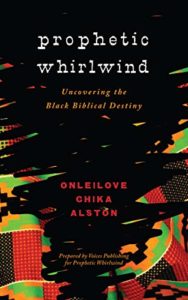 Prophetic Whirlwind: Uncovering the Black Biblical Destiny Onleilove Chika Alston (Voices Publishing) $24.99 Again, every now and then we are just delighted to find a vibrant writer and spokesperson who is doing extraordinary work but whose book is not widely known outside of their own niche circles.
Prophetic Whirlwind: Uncovering the Black Biblical Destiny Onleilove Chika Alston (Voices Publishing) $24.99 Again, every now and then we are just delighted to find a vibrant writer and spokesperson who is doing extraordinary work but whose book is not widely known outside of their own niche circles.
We have heard of Onleilove (who holds both an M.Div and MSW degrees) since she was an active student leader at Penn State, a scholar in New York City, an activist in Baltimore, and a contributed editor to Sojourners. (In fact, she had a much-cited cover story on “King Coal” and other Appalachian struggles. Kudos to Leroy and Donna Barber for re-issuing her Prophetic Whirlwind book through their recent Voices Project.
Prophetic Whirlwind is a whirlwind tour through a lot of content, deftly combining historical research and Bible study, African American studies scholarship and African stories. She has traveled all around the world (Scotland! Switzerland!) lecturing on her topic about the African roots of the Bible (and the Hebraic culture preserved in Africa!) Is the Bible an African book? Are some of the indigenous cultures of black people really the social context of some of the Bible? Why have many missed the allusions to many African and black-skinned people and cultures in the Scriptures? Who and where are the “lost tribes” of Israel? Why do many African tribes seem to have Hebraic connections?
She was asked to come to West Africa by the African Hebrew leaders there and has done research in Ghana, Togo, Nigeria. This is mind-blowing and fascinating stuff, and while not the first book exploring this “white washing” of the Bible, it is certainly one of the best.
It is a unique book, even within Afro-centric Biblical studies and you should know about it. The author worships with Beth-El The House of Yahweh, a 65-year old Messianic Hebrew congregation in the South Bronx.
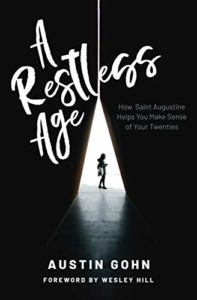 A Restless Age: How Saint Augustine Helps You Make Sense of Your Twenties Austin Gohn (with a foreword by Wesley Hill) (GCD Books) $12.99 As many are waiting on the forthcoming work by Jamie Smith (On the Road with Saint Augustine) might I suggest this as an excellent companion volume. In fact, whether you are attracted to Smith’s heady study or not, A Restless Age is the best introduction to Augustine’s Confessions I have yet seen. Everybody knows that Confessions (for any number of reasons) is an important classic in the Western canon and a must-read for anyone wanting to be fluent in the standards of ancient Christian books.
A Restless Age: How Saint Augustine Helps You Make Sense of Your Twenties Austin Gohn (with a foreword by Wesley Hill) (GCD Books) $12.99 As many are waiting on the forthcoming work by Jamie Smith (On the Road with Saint Augustine) might I suggest this as an excellent companion volume. In fact, whether you are attracted to Smith’s heady study or not, A Restless Age is the best introduction to Augustine’s Confessions I have yet seen. Everybody knows that Confessions (for any number of reasons) is an important classic in the Western canon and a must-read for anyone wanting to be fluent in the standards of ancient Christian books.
We met this young pastor, Austin Gohn, at the Pittsburgh Jubilee conference a few years ago when he was in the research stage for this book; he was fired up and confident and a year later, the book was in production. What a delight to have seen it develop, to come to know Austin just a bit, to realize that he is a rare leader – a lively evangelical working with teens and young adults who has read deeply and widely. And he gets exactly how Augustine’s own restlessness is similar to the postmodern angst and restlessness of emerging adults in these days. This book is a great introduction to the great third century frat boy turned seeker turned disciple of Jesus who became a Bishop from Northern African.
Here is what I want to be clear about: A Restless Age is a book for anyone even though Gohn wisely guides young adults through this relevant text, showing how Confessions can be useful for such young-ish readers. But I think it is equally helpful for any of us who need some help realizing why Augustine is important. It is more than a “Cliff Notes” summary, although it might serve that useful function for someone who has no idea what to expect from reading Confessions. Gohn even has a fabulous appendix which is a playful and candid reader’s guide, inviting beginners to even skip certain parts of the tome (the first time through, at least) telling us what to look for and what to watch out for. Gohn recommends, by the way, the lovely, lively translation by Sarah Ruden who has a great endorsing blurb on the back. Nice!
So, if you are new to Augustine no matter your age, you will enjoy A Restless Age. If you are in your late teens or a twenty-something, by all means, realize this book is for you. And if you care about young adults, are a youth leader or college minister or campus pastor/chaplain, or parent of a millennial, you really should read this book. It’s from a small, classy publisher you may not have heard of. We’re thrilled to be able to let folks know about it.
As Wes Hill writes in his generous introduction,
Although it’s been almost a decade since I exited my twenties, I still recall with mingled happiness and grief my trip through those trying, stretching, enlivening years. I started to question the certainties of my childhood faith. I fell in love for the first time and lost my best friend. I moved away from home and tried to forge a new identity. Through it all, I never lost my hunger to fine God – or to be found by Him. I wish I had had A Restless Age to read during those years, not only for its witty diagnoses of twentysomething angst and its “Oh that’s so true!” insights into what makes young adults tick but also for its generous, compelling introduction to a saint who could have helped me hold on to faith and maybe even thrive.
Listen to our friend Erica Young Reitz, who wrote the fabulous After College:
One of life’s biggest struggles for twentysomethings – for most of us – is making time for self-reflection in the midst of our hurried, on-to-the-next-thing lives. We’re running on the outside and restless on the inside == just like Saint Augustine. With witty metaphors and a deep understanding of our cultural moment, Austin Gohn brings this ancient saint into our present struggles. A Restless Age normalizes our angst, but — most importantly – offers a way out of it.
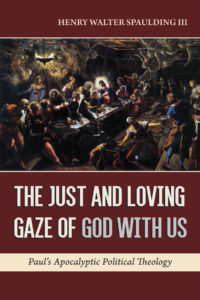 The Just and Loving Gaze of God With Us: Paul’s Apocalyptic Political Theology Henry Walter Spaulding III (Wipf & Stock) $36.00 Hank has become a good friend and a great customer of ours, even stopping by the store (on his way to and fro from, oh, say, stuff like a Princeton Barth conference where he was presenting.) Young, casual, widely read, a passionate teacher and principled supporter of indie booksellers like us – what’s not to like? Well, I have to admit, I’m inclined to promote books by authors who support us (it’s a bit annoying when folks expect us to sell their book, even if they’ve never darkened our door or sent us as much as a an email and push people to Amazon regularly on their own social media. Really?) But Hank showed up here seeking books perhaps not even knowing we had his book in our cluttered and jam-packed New Testament section. With blurbs on the back from the likes of William Cavanaugh and citing many other “ethical” readings of Pauline politics I realized quickly that The Just and Loving Gaze is a serious and important contribution to New Testament studies and contemporary discipleship. Now that we’ve met him, we’re even more thrilled to tell you about it and to commend it to you.
The Just and Loving Gaze of God With Us: Paul’s Apocalyptic Political Theology Henry Walter Spaulding III (Wipf & Stock) $36.00 Hank has become a good friend and a great customer of ours, even stopping by the store (on his way to and fro from, oh, say, stuff like a Princeton Barth conference where he was presenting.) Young, casual, widely read, a passionate teacher and principled supporter of indie booksellers like us – what’s not to like? Well, I have to admit, I’m inclined to promote books by authors who support us (it’s a bit annoying when folks expect us to sell their book, even if they’ve never darkened our door or sent us as much as a an email and push people to Amazon regularly on their own social media. Really?) But Hank showed up here seeking books perhaps not even knowing we had his book in our cluttered and jam-packed New Testament section. With blurbs on the back from the likes of William Cavanaugh and citing many other “ethical” readings of Pauline politics I realized quickly that The Just and Loving Gaze is a serious and important contribution to New Testament studies and contemporary discipleship. Now that we’ve met him, we’re even more thrilled to tell you about it and to commend it to you.
I can’t say for sure who should buy a book like this; it is serious, academic (most likely a PhD dissertation made more user-friendly for a wider audience) but yet would appeal to those who have read, say, Roman’s Disarmed or even the good work of Michael Gorman, who he esteems. In this work, Spaulding quotes womanist ethicist Emily Townes and, naturally, political exegetes like Neil Elliott. He does the critique of modernity a la Foucault and Walter Benjamin. This maybe leads him to Oliver O’Donovan. From his time at Duke he became friends with race scholars Willie Jennings and J. Kameron Carter and knows Amy Laura Hall. He draws on Yoder a bit, which I suspect he got from Hauerwas, and thanks Richard Hays. He loves Barth’s epistle to the Romans and is a Wesleyan. So there ya go.
And he is a clear writer; a good teacher who cares about the gospel and its implications for the hyper-modern world.
As Philip Ziegler (of the University of Aberdeen) says:
Provoked by recent philosophical interest in the Apostle Paul, Spaulding here pushes back into Paul’s inalienably theological politics in pursuit of an understanding of Christian political responsibility today. The resulting theological, biblical, and philosophical conversation that ensues is rich and engaging, drawing together a range of voices (when did Wesley, Kasemann, Arendt, and Iris Murdoch last meet one another on the pages of a book!) It offers a compelling vision of an inhabitable Pauline politics of both the already and the not yet.
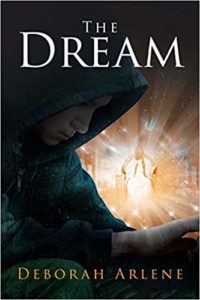 The Dream: A Novel Deborah Arlene (Christian Faith Publishing) $16.95 If you visit our Hearts & Minds Facebook group you might find a handful of folks offering suggestions and reviews. I invited Deborah to tell us there just a bit about her new novel in part because – whether it’s high quality, literary literature or just an inspiring, earnest story nicely told – some books deserve to be known. And there’s a bit of backstory about The Dream, and it is so frustrating. Let me explain. First, you should know that it is a story that has an anti-abortion message, or, I should say, a truly pro-life one, as the tender story embraces the controversial and painful topic of abortion by imagining the tale of a woman who is helped by good folks at a Christian crisis pregnancy center. As one who has been involved with a couple such centers, I am happy to know there is a novel that captures the life-changing stories that the care-givers in those places hear and help facilitate day in and day out. Carrying a pregnancy to term when the situation is complicated is emotionally hard, and the support these sorts of places give is often extraordinary. The hardships of an unexpected (and, at first, perhaps unwanted) pregnancy can be made less so with a little bit of lovin’ care. This shouldn’t be controversial, and all sides of the policy and legal debates should affirm that helping women with her choice to carry a crisis pregnancy is a good thing.
The Dream: A Novel Deborah Arlene (Christian Faith Publishing) $16.95 If you visit our Hearts & Minds Facebook group you might find a handful of folks offering suggestions and reviews. I invited Deborah to tell us there just a bit about her new novel in part because – whether it’s high quality, literary literature or just an inspiring, earnest story nicely told – some books deserve to be known. And there’s a bit of backstory about The Dream, and it is so frustrating. Let me explain. First, you should know that it is a story that has an anti-abortion message, or, I should say, a truly pro-life one, as the tender story embraces the controversial and painful topic of abortion by imagining the tale of a woman who is helped by good folks at a Christian crisis pregnancy center. As one who has been involved with a couple such centers, I am happy to know there is a novel that captures the life-changing stories that the care-givers in those places hear and help facilitate day in and day out. Carrying a pregnancy to term when the situation is complicated is emotionally hard, and the support these sorts of places give is often extraordinary. The hardships of an unexpected (and, at first, perhaps unwanted) pregnancy can be made less so with a little bit of lovin’ care. This shouldn’t be controversial, and all sides of the policy and legal debates should affirm that helping women with her choice to carry a crisis pregnancy is a good thing.
Alas, Deborah told me that for some odd reason, Twitter cancelled all her followers. They somehow though her simple story was too controversial for even the wild digital West of social media. Are you kidding me? She rebuilt a bunch of followers and tried again to communicate with them about her new novel and – yep – got oddly banished again. I see this as an inexplicable affront to liberal values like freedom of speech and freedom of the arts, but can’t say much more since I don’t understand why Twitter would ban an innocuous, inspiring story about evangelical women helping promote their pro-life views by actually helping another woman. Maybe they realize that a simple story can be more subversive than we think: maybe various sides of this issue might see things a bit differently by engaging a tale like this that is honest about the twists and turns of those involved in these kinds of complex decisions. Even if the big guns try to silence her, we’re happy to stock this new novel by a central Pennsylvania writer.
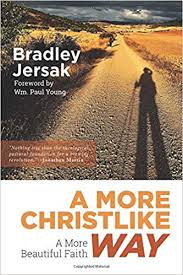 A More Christlike Way: A More Beautiful Faith Bradley Jersak (CWR Press) $19.99 I’m really excited to tell you about this small press release even though I don’t even know what CWR Press is; its related to CWR Magazine, which is some Jesusy Canuck ‘zine that I also don’t know much about. But I love this author! We’ve stocked other books by this ambitious thinker and Dean of the Masters of Ministry program at St. Stephen’s University in New Brunswick, Canada. We stock his serious academic tomes like Her Gates Will Never Be Shut about “Hell, Hope, and the New Jerusalem” to the lovely, thoughtfully done children’s picture book with sophisticated text, Jesus Showed Us! This new one, A More Christlike Way is a sequel to his A More Christlike God: A More Beautiful Gospel. In each case, Jersak is doing what other thinkers are also helping us with (I think of Brian Zahnd and his Sinners in the Hands of a Loving God) in raising up a very high Christology and insisting that however we know God, think about the Old Testament, o define the gospel itself, it has to be done through the lens of Jesus the Christ, the second person of the Trinity, God-in-the-flesh. It is hard to argue with that, it seems to me, and his pressing Christ-like and Christ-commanded compassion to its logical implications (a non-violent understanding of the atonement, a Christ-like mercy in thinking about eternity, a Kingdom-centered gospel where Christ is lifted up and actually followed, and the like) is urgent, vital, important. Theologians will debate all of this, I’m sure, but Jersak here sets forth, as Zahnd puts it, “a vision for following Jesus that is in keeping with the kind of faith that first turned the world upside down two thousand years ago.”
A More Christlike Way: A More Beautiful Faith Bradley Jersak (CWR Press) $19.99 I’m really excited to tell you about this small press release even though I don’t even know what CWR Press is; its related to CWR Magazine, which is some Jesusy Canuck ‘zine that I also don’t know much about. But I love this author! We’ve stocked other books by this ambitious thinker and Dean of the Masters of Ministry program at St. Stephen’s University in New Brunswick, Canada. We stock his serious academic tomes like Her Gates Will Never Be Shut about “Hell, Hope, and the New Jerusalem” to the lovely, thoughtfully done children’s picture book with sophisticated text, Jesus Showed Us! This new one, A More Christlike Way is a sequel to his A More Christlike God: A More Beautiful Gospel. In each case, Jersak is doing what other thinkers are also helping us with (I think of Brian Zahnd and his Sinners in the Hands of a Loving God) in raising up a very high Christology and insisting that however we know God, think about the Old Testament, o define the gospel itself, it has to be done through the lens of Jesus the Christ, the second person of the Trinity, God-in-the-flesh. It is hard to argue with that, it seems to me, and his pressing Christ-like and Christ-commanded compassion to its logical implications (a non-violent understanding of the atonement, a Christ-like mercy in thinking about eternity, a Kingdom-centered gospel where Christ is lifted up and actually followed, and the like) is urgent, vital, important. Theologians will debate all of this, I’m sure, but Jersak here sets forth, as Zahnd puts it, “a vision for following Jesus that is in keeping with the kind of faith that first turned the world upside down two thousand years ago.”
The endorsements on the back of A More Christlike Way come from a wide variety of readers – Wendy Gritter, who wrote Generous Spaciousness, Jim Forest, the Orthodox peacemaker (and old friend of Thomas Merton and Dorothy Day) and Father Kenneth Tanner (an evangelically-minded Anglican) who says that “Jersak is here your reliable Sherpa, a guide and fellow pilgrim…”
By the way, we have his other small-sized, brand new, independently published release, In: Incarnation & Inclusion, Abba & Lamb (St. Macrina Press; $18.95.) Yes!
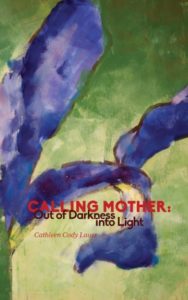 Calling Mother: Out of Darkness into Light Cathleen Cody Lauer (self published) $19.95 This wondrous book is a small, quiet gem, wonderfully crafted and creatively written. It is nearly a small art book – more than a poet’s chapbook – but glorious in that same, artful way; the paper quality is good and there are touches of color throughout. To have it in your hand is to realize you are experiencing something very special, owning a book that but for serendipity you may not otherwise even know about, and you will be glad. Perhaps offering an outright “thanks be to God” or a Nunc Dimittis. How did we even learn of this?
Calling Mother: Out of Darkness into Light Cathleen Cody Lauer (self published) $19.95 This wondrous book is a small, quiet gem, wonderfully crafted and creatively written. It is nearly a small art book – more than a poet’s chapbook – but glorious in that same, artful way; the paper quality is good and there are touches of color throughout. To have it in your hand is to realize you are experiencing something very special, owning a book that but for serendipity you may not otherwise even know about, and you will be glad. Perhaps offering an outright “thanks be to God” or a Nunc Dimittis. How did we even learn of this?
Cathleen has long been a supporter of our store and her husband, Jonathan, is a dear pal – he spent most of his professional career laboring as a librarian at Messiah College near us in central Pennsylvania. (And on occasion, teaching legendary courses on Bob Dylan.) Cathleen took up writing a decade or more ago and started to experiment with her craft – journals, memories, essays, poems, prayers, and more. About the same time she was learning to be a spiritual director, increasingly entering that world of ecumenical spirituality and contemplative reflections. And she wanted to write.
As she tells us in the beginning of Calling Mother she started using her phone calls with her colorful, elderly mother as a catalyst, a holy nudge, to pick up her pen. This new powerful collection of short essays and ruminations is the result.
I like very much that she utilized the extraordinary gifts of small bookmaker and graphic designer Kathy Hettinga to do the artful design work for Calling Mother. Hettinga has a brief afterward explaining some of the historically inspired doo-dads (okay, that’s not the word for these shapes that adorn the pages – they are actually Bodoni Ornaments from 1798 and the more modern (1997) Hypnopaedia. These touches – along with some exceptionally well-selected handwriting pages reproduced from Cathleen’s grandmother! – make this a delight to behold.
With the passing of my own mother a few weeks ago, I am sadder than I think I expected to be. I’m not sure why I need to write this to you other than to say that his poignant book is, as I’ve noted, a set of memories and creative writing pieces inspired by real conversation the author had with her aging mother and it has come to mean a lot to me, now. A few of the essays capture, in fact, good talks they had not long before Cecelia died. There is stuff here about calling home, about calling mom and it moves me just thinking about this holy ritual. Some of you know what I’m talking about. Although the lovely prose (and a few poems and prayers) about these calls will surely be appreciated and pondered by many readers – especially those of us with aging parents, or those of us interested in our parent’s own younger lives – it really is a mother/daughter book. It is about their relationship, more so, their conversations and, as one reviewer put it, the holy silences in the spaces.
Do you wonder what mindful conversations are really like? Would you like to deepen the habits of heart that allow you to ponder good talks with loved ones? Do you wish for deeper relationships with your own parents? This great little book documents an authentic relationship and is a beautiful artifact of those conversations. And the holy spaces. We are so pleased to commend it to you. Perhaps you might even give it to your own mother (or daughter.)
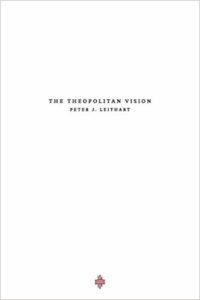 The Theopolitan Vision Peter J. Leithart (Theopolis Books/Athanasius Press) $12.95 Do you know Peter Leithart and his fascinating, Birmingham-based “Theopolis Institute”? He invites men and women into an intense, residential Fellows program relating, as they put it, “Bible, liturgy and culture.” Doc Leithart is colorful, undeniably brilliant, liturgically-minded, Reformed. You many know of his serious Bible commentaries, his little studies of Jane Austen, or his little book Shining Glory on the Terrence Malick film The Tree of Life which he relates to the book of Job. He’s done Between Babel and the Beast (on “America and Empires in Biblical Perspective”) and a curious study called Defending Constantine: The Twilight of Empire and the Dawn of Christendom that I suspect I don’t adequately understand. Leithart has written on Mercersburg theology and did a fabulous book called Solomon Among the Postmoderns. I liked this Traces of the Trinity: Signs of God in Creation and Human Experience. He did a big, scholarly book on the history and experience of gratitude published in hardback by Baylor University Press. And that’s not even all of it. Despite this prodigious, thoughtful output, he’s started this recent educational/formational ministry and this new little book is a bit of a manifesto.
The Theopolitan Vision Peter J. Leithart (Theopolis Books/Athanasius Press) $12.95 Do you know Peter Leithart and his fascinating, Birmingham-based “Theopolis Institute”? He invites men and women into an intense, residential Fellows program relating, as they put it, “Bible, liturgy and culture.” Doc Leithart is colorful, undeniably brilliant, liturgically-minded, Reformed. You many know of his serious Bible commentaries, his little studies of Jane Austen, or his little book Shining Glory on the Terrence Malick film The Tree of Life which he relates to the book of Job. He’s done Between Babel and the Beast (on “America and Empires in Biblical Perspective”) and a curious study called Defending Constantine: The Twilight of Empire and the Dawn of Christendom that I suspect I don’t adequately understand. Leithart has written on Mercersburg theology and did a fabulous book called Solomon Among the Postmoderns. I liked this Traces of the Trinity: Signs of God in Creation and Human Experience. He did a big, scholarly book on the history and experience of gratitude published in hardback by Baylor University Press. And that’s not even all of it. Despite this prodigious, thoughtful output, he’s started this recent educational/formational ministry and this new little book is a bit of a manifesto.
Here is how his publisher describes the small book, the first in a handful of succinct tracts about the vision for the Institute. It’s a bit generic, I suppose, but if you know Dr. Leithart, you know the small The Theopolitan Vision is anything but generic and certainly spicy enough to stimulate even the hardest of hearts.
As the modern world crumbles, Christians scramble for answers. The solution is the Christian church, an outpost of the heavenly city among the cities of men. The author explains what the church is, and how the Spirit empowers the church’s world-transforming mission through Word and worship, and Scripture and liturgy. It shows how the church can be a city of light in a dark age.
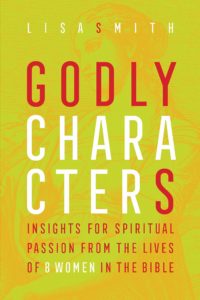 Godly Character(s): Insights for Spiritual Passion from the Lives of 8 Women in the Bible Lisa Smith (Square Halo Books) $16.99 How can I offer a list of rare books by indie publishers and not mention our friends at the classy boutique publisher out of Lancaster, PA, called, curiously, Square Halo Books? We love this little outfit and appreciate their eager collaboration with us. (They are the ones who surprised us with a book on our bookstore’s 35th anniversary, created with chapters by friends and respected scholars, called A Book for Hearts & Minds: What to Read and Why.) You may know they do widely respected books on faith and the arts, on popular culture (like BIgger on the Inside, their book on Doctor Who) and books that teach us how to best “lean in” to and faithfully engage our contemporary world. (See, for instance, the fabulous, entertaining and deeply wise Good Posture: Engaging Current Culture with Ancient Faith by Square Halo booster and pal, Tom Becker of the Lancaster Row House Forums. And, okay, I’ll say it — my own little book, the quite handsome and meaty Serious Dreams: Big Ideas for the Rest of Your Life.) We stock all the books that Square Halo publishes and have reviewed all of their two dozen or so books here at BookNotes. They are top-shelf!
Godly Character(s): Insights for Spiritual Passion from the Lives of 8 Women in the Bible Lisa Smith (Square Halo Books) $16.99 How can I offer a list of rare books by indie publishers and not mention our friends at the classy boutique publisher out of Lancaster, PA, called, curiously, Square Halo Books? We love this little outfit and appreciate their eager collaboration with us. (They are the ones who surprised us with a book on our bookstore’s 35th anniversary, created with chapters by friends and respected scholars, called A Book for Hearts & Minds: What to Read and Why.) You may know they do widely respected books on faith and the arts, on popular culture (like BIgger on the Inside, their book on Doctor Who) and books that teach us how to best “lean in” to and faithfully engage our contemporary world. (See, for instance, the fabulous, entertaining and deeply wise Good Posture: Engaging Current Culture with Ancient Faith by Square Halo booster and pal, Tom Becker of the Lancaster Row House Forums. And, okay, I’ll say it — my own little book, the quite handsome and meaty Serious Dreams: Big Ideas for the Rest of Your Life.) We stock all the books that Square Halo publishes and have reviewed all of their two dozen or so books here at BookNotes. They are top-shelf!
Their most recent release is Godly Character(s) and I did indeed give it a nice mention when it arrived several months back. Alas, it is so handsomely done, so winsome and smart, so engagingly written, that it surely deserves another shout-out here. Lisa Smith is a college literature professor so she is a good writer, creative and eloquent and colorful and vivid. She tells about Bible characters and relates them wonderful to our contemporary culture. She mixes references from acclaimed literature and pop culture, relating Word to world in a way that is gospel-clear and yet beautifully relevant. To be sure, it is about gaining a passion for habits of godliness and it is about how God’s grace can transform us from the inside out. This is the point – helping us all be shaped in Christ-likeness in these weird times. That she does it through a good study of women In the Bible is nice – and not just for women readers or ladies Bible studies.
The book is rich and engaging, so this blurb doesn’t quite capture it all, but here is how they explain their final hopes for it:
Igniting spiritual passion doesn’t have to be a mysterious process. By conforming our character to God’s design, we can awaken in our hearts a sincere love for him. That rekindled affection can drive us to deeper intimacy with God and lead to greater joy in our daily lives.
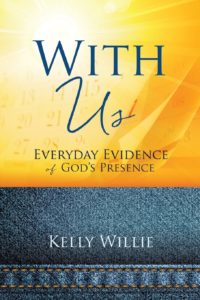 With Us: Everyday Evidence of God’s Presence Kelly Willie (XulonElite) $15.99 When this inspiring, delightful book first came out, I was eager to read it and happy to promote it. It is about a topic we think folks find helpful — the spirituality of the ordinary, so to speak — and also because it was nicely written, sensible, interesting, with some great stories and illustrations of her spiritual discoveries. One reviewer on the back cover said “With Us is a wakeup call for the soul that has been lulled to sleep by the inattentiveness to God’s presence every day.”
With Us: Everyday Evidence of God’s Presence Kelly Willie (XulonElite) $15.99 When this inspiring, delightful book first came out, I was eager to read it and happy to promote it. It is about a topic we think folks find helpful — the spirituality of the ordinary, so to speak — and also because it was nicely written, sensible, interesting, with some great stories and illustrations of her spiritual discoveries. One reviewer on the back cover said “With Us is a wakeup call for the soul that has been lulled to sleep by the inattentiveness to God’s presence every day.”
Ms Willie is a contemporary worship pastor at the large Grace Church just south of us in Shrewsbury PA and is a singer-songwriter with some Gospel Music Association connections Nashville. Maybe because she is an artist she has a particularly keen sense of what it means to see God’s creative hand as we “number our days” day by day.
We’ve made big lists of books about the spirituality of the mundane and how to practice the presence of God in ordinary stuff. From the best-selling, incredibly interesting and wise Liturgy of the Ordinary by Tish Harrison Warren to the beautiful A Tree Full of Angels: Seeing the Holy in the Ordinary by Sister Macrina Wiederkehr to the latest by popular woman’s writer Shannan Martin, The Ministry of Ordinary Places: Waking Up to God’s Goodness Around You there are lots of books that help us expect to sense God’s presence in the commonplaces of life.
Yet, although With Us is somewhat like those sorts of books, celebrating God’s sometimes quiet intrusion into our daily lives, this one has a certain upbeat verve to it that was captivating for me, making it a real encouragement. Other authors give you tools and techniques to move towards mindfulness or a centered attentiveness to the love and presence of God. This book tells you about how the author herself discovered that, coming to know and trust God more deeply, day by day. And what discoveries she has had!
Kelly Willie has survived near death experiences and (maybe surprisingly?) is still, obviously a fun and funny person who likes to laugh. She has seen some hard stuff, but still wants to follow Jesus. She trusts the Divine pointers she’s discerned and followed the glimpses of His glory in a way that she really, truly believes that God is pursuing us and that if we are open, we, too, can discern these “fingerprints that are evident everywhere.”
With Us has 30 chapters, each rooted around an episode that she brings to life through her splendid storytelling. Some of her exploits are hilarious, some quite serious, most really down-to-Earth. Given that she is a worship leader at an evangelical mega-church, I assumed With Us would be overly pious with lots of charismatic lingo. Of course, there is some of that. And the girl can preach! But I was delighted at how down to earth and real she was. Kelly explores a theme in each chapter — but it isn’t too didactic or self-evident, as the insights unfold through the story. The stories are simply rendered and captivating, as she introduces us to a cast of characters, from a woman who wore pearls with her flannel and camo to the tender, awful story of the death of a child, to “cliff jumping” with her hubby. Or a chapter about our legendary friends at the local Brown’s Orchard where she plays the role of Norm from Cheers. There is plenty of Bible references here and there are reflection questions inviting us to go a bit deeper in our own faith journey. With Us is a nice book by a local evangelical leader and we are happy to tell you about it.
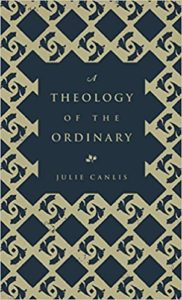 A Theology of the Ordinary Julie Canlis (Godspeed Press) $12.99 I mentioned above our fascination with books about ordinary life, about the spirituality of the mundane, about practicing God’s presence in the quotidian of daily life. There are remarkable books about this, and many are anecdotal or experiential or in the genre of spirituality, I suppose. But this, this is a bit different and nothing short of brilliant. Quiet, but brilliant. A Theology of the Ordinary is less a spiritually or reflection and more a theology; not academic, but still. It is written by a woman with a PhD in theology who has written a stunning, academic book on John Calvin (Calvin’s Ladder: A Spiritual Theology of Ascent and Ascension) but the impetus for the writing of this is part of the story. And it’s a great story.
A Theology of the Ordinary Julie Canlis (Godspeed Press) $12.99 I mentioned above our fascination with books about ordinary life, about the spirituality of the mundane, about practicing God’s presence in the quotidian of daily life. There are remarkable books about this, and many are anecdotal or experiential or in the genre of spirituality, I suppose. But this, this is a bit different and nothing short of brilliant. Quiet, but brilliant. A Theology of the Ordinary is less a spiritually or reflection and more a theology; not academic, but still. It is written by a woman with a PhD in theology who has written a stunning, academic book on John Calvin (Calvin’s Ladder: A Spiritual Theology of Ascent and Ascension) but the impetus for the writing of this is part of the story. And it’s a great story.
Maybe you have heard of Godspeed which is a set of short films about an energetic, world-changing, zealous, young (very American) pastor who went to Scotland and learned to settle down, move slow, care for his people and place, become known — he learned to take up such calm and focused ministry not (only) by reading Eugene Peterson or the novel Love Big Be Well or Wendell Berry, but by walking alongside a sane, caring, parish pastor. Together with his wife — the aforementioned Julie Canlis — Matt was transformed to a new identity and pace of life and different sorts of affections. We stock the seven-week study guide to Godspeed, by the way, and would love to talk more about it.
But here, now, I want you to know of this precious small press (they’ve just done the short films, the study guide, and, yep, A Theology of the Ordinary. The book is handsomely made, classy, even though it is a thin, mass market size. The book came from three lectures she gave (at Whitworth College in Spokane, WA) after returning to the States after their experience in the UK and in those lectures she explored a Trinitarian theology to undergird the notion that our ordinary lives in God’s real world is, truly, the only place we have to see God work. Our Christian growth is, literally, down to Earth and does not have to be extraordinary.
Here’s how they tell the story:
Upon returning home to America, Julie Canlis was struck by the emphasis within Christian circles on being ‘extraordinary’ or ‘radical’ or ‘passionate’ for God. But what about the goodness (and challenge) of living our ‘normal’ lives for God? The joys and challenges of living an ordinary life in the presence of God gave rise to this little book, and is the lived theology behind what Godspeed is about
With an easy, conversational style, she writes about the blessing of the Father on ordinary life and creation and the inhabitation of the Son in ordinary life as the rule, not exception, for redemption and the ways the Spirit works in our ordinary lives to bring us into the new creation.
With each section, she also examines a ‘cultural temptation’ that threatens to undermine our ability to offer God our ordinary lives. The questions at the end of each chapter make this a fabulous book for small groups and book clubs. What a shame most readers — on the lookout for substantial, classy, thoughtful, approachable books — don’t know about it. You’re welcome.
Again, we noted the regular retail price. We’ll gladly deduct a 20% off for you on any orders. Just use the link to our bookstore order form page and tell us what you want. Thanks for shopping small, supporting indie presses, and giving lesser known authors a chance.
BookNotes

SPECIAL
DISCOUNT
20% OFF
ANY BOOK MENTIONED
+++
order here
this takes you to the secure Hearts & Minds order form page
just tell us what you want
inquire here
if you have questions or need more information
just ask us what you want to know
Hearts & Minds 234 East Main Street Dallastown PA 17313
read@heartsandmindsbooks.com
717-246-3333

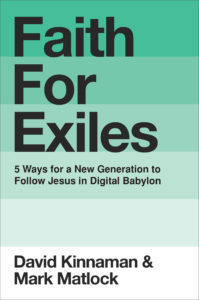 Faith for Exiles: 5 Ways for a New Generation to Follow Jesus in Digital Babylon David Kinnaman & Mark Matlock (Baker) $21.99 OUR SALE PRICE = $17.59. For some in our audience, this will be a very important book as they have already read what might be seen as the first two in a trilogy co-authored by David Kinnaman. Whether you’ve read them or not, you most likely have heard of the Barna research and the books that came out about young adults who are not Christians and their views of the church (unChristian) or who have left the church of their youth (You Lost Me.) Both of those important books showed that churches of all sorts have a major problem in that many older teens and 20-something think the church is unhelpful and the gospel is irrelevant (or worse.) Those two books explain, in some detail, what the data suggests about how we in the churches have failed our young adults. In a nutshell, one might say those books diagnose the problem and feature (as they should) what we’re doing wrong.
Faith for Exiles: 5 Ways for a New Generation to Follow Jesus in Digital Babylon David Kinnaman & Mark Matlock (Baker) $21.99 OUR SALE PRICE = $17.59. For some in our audience, this will be a very important book as they have already read what might be seen as the first two in a trilogy co-authored by David Kinnaman. Whether you’ve read them or not, you most likely have heard of the Barna research and the books that came out about young adults who are not Christians and their views of the church (unChristian) or who have left the church of their youth (You Lost Me.) Both of those important books showed that churches of all sorts have a major problem in that many older teens and 20-something think the church is unhelpful and the gospel is irrelevant (or worse.) Those two books explain, in some detail, what the data suggests about how we in the churches have failed our young adults. In a nutshell, one might say those books diagnose the problem and feature (as they should) what we’re doing wrong. This long-awaited third one in this series, Faith for Exiles, however, offers some practical (if at times visionary) notions based on the latest Barna studies about churches and ministries that have retained their young adults or ministries; Faith for Exiles examines programs and practices that have been successful and fruitful in effective ministry with that age group. For those that want guidance, ideas, suggestions, best practices, and solid stuff that works in doing ministry with young adults, Faith for Exiles is a must-read.
This long-awaited third one in this series, Faith for Exiles, however, offers some practical (if at times visionary) notions based on the latest Barna studies about churches and ministries that have retained their young adults or ministries; Faith for Exiles examines programs and practices that have been successful and fruitful in effective ministry with that age group. For those that want guidance, ideas, suggestions, best practices, and solid stuff that works in doing ministry with young adults, Faith for Exiles is a must-read.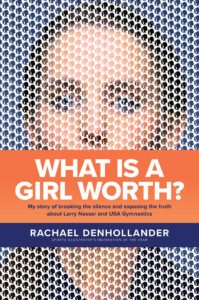 What Is a Girl Worth? My Story of Breaking the Silence and Exposing the Truth About Larry Nassar and USA Gymnastics Rachael Denhollander (Tyndale) $26.99 OUR SALE PRCE = $21.59. We are proud to be able to promote this and trust that many other bookstores will champion this riveting, troubling and inspiring memoir of a Christian leader who has become an international hero. That she and her husband have gotten disgusting letters and social media harassment makes us want to try even harder to show off this fine Christian book. I has gotten some national attention already, received a starred review at Publishers Weekly and is going to be widely discussed. Beth Moore (herself a sexual abuse survivor) has recently said, “This is one of the most important books you’ll ever read.”
What Is a Girl Worth? My Story of Breaking the Silence and Exposing the Truth About Larry Nassar and USA Gymnastics Rachael Denhollander (Tyndale) $26.99 OUR SALE PRCE = $21.59. We are proud to be able to promote this and trust that many other bookstores will champion this riveting, troubling and inspiring memoir of a Christian leader who has become an international hero. That she and her husband have gotten disgusting letters and social media harassment makes us want to try even harder to show off this fine Christian book. I has gotten some national attention already, received a starred review at Publishers Weekly and is going to be widely discussed. Beth Moore (herself a sexual abuse survivor) has recently said, “This is one of the most important books you’ll ever read.” Rachael Denhollander’s voice was heard around the world when she spoke out to end the most shocking scandal in US gymnastics history. The first victim to publicly accuse Larry Nassar, the former USA Gymnastics team doctor who abused hundreds of young athletes, Rachael now reveals her full story for the first time. How did Nassar get away with it for so long? How did Rachael and the other survivors finally stop him and bring him to justice? And how can we protect the vulnerable in our own families, churches, and communities?
Rachael Denhollander’s voice was heard around the world when she spoke out to end the most shocking scandal in US gymnastics history. The first victim to publicly accuse Larry Nassar, the former USA Gymnastics team doctor who abused hundreds of young athletes, Rachael now reveals her full story for the first time. How did Nassar get away with it for so long? How did Rachael and the other survivors finally stop him and bring him to justice? And how can we protect the vulnerable in our own families, churches, and communities?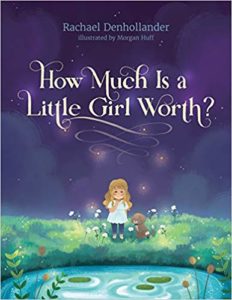 By the way, we also have the soon to be released How Much Is a Little Girl Worth? a children’s book also written by Rachel Denhollander (and illustrated by Morgan Huff) released by Tyndale Kids! ($14.99; OUR SALE PRICE = $11.99.) It’s very nicely done. More on that later…
By the way, we also have the soon to be released How Much Is a Little Girl Worth? a children’s book also written by Rachel Denhollander (and illustrated by Morgan Huff) released by Tyndale Kids! ($14.99; OUR SALE PRICE = $11.99.) It’s very nicely done. More on that later…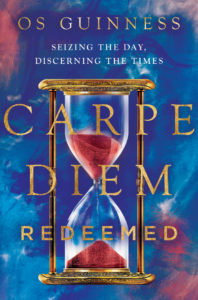 Carpe Diem Redeemed: Seizing the Day, Discerning the Times Os Guinness (IVP) $20.00 OUR SALE PRICE = $16.00. Those that know me know that one of my favorite books — and one we promote tirelessly — is The Call: Finding and Fulfilling God’s Purpose for Your Life, which was released last year in an anniversary edition, a bit more trim in size but with some editing, expansion, and a few new chapters. This book almost single-handedly help create a hunger within certain parts of North American evangelicalism to explore the long-neglected doctrine of calling, especially as it applies to ordinary folks. For too long only priests and nuns, ministers and missionaries, got to use the language of discerning and receiving a call to a particular vocation and Guinness explores how that de-formation happened, how a revitalization of Western culture depends upon a renewed focus on faith and calling, and how a “purpose driven life” is more, much more, than many have realized. Erudite and gracious, literary and beautifully informed by great stories from history (from the Greeks and Romans through to Winston Church and many modern folks, from Picasso to the great filmmaker who created Lawrence of Arabia and the curious jazzman Coltrane.) Guinness is well read and Biblically wise and The Call is simply a contemporary masterpiece, a book nearly everyone should read at least once in their lives.
Carpe Diem Redeemed: Seizing the Day, Discerning the Times Os Guinness (IVP) $20.00 OUR SALE PRICE = $16.00. Those that know me know that one of my favorite books — and one we promote tirelessly — is The Call: Finding and Fulfilling God’s Purpose for Your Life, which was released last year in an anniversary edition, a bit more trim in size but with some editing, expansion, and a few new chapters. This book almost single-handedly help create a hunger within certain parts of North American evangelicalism to explore the long-neglected doctrine of calling, especially as it applies to ordinary folks. For too long only priests and nuns, ministers and missionaries, got to use the language of discerning and receiving a call to a particular vocation and Guinness explores how that de-formation happened, how a revitalization of Western culture depends upon a renewed focus on faith and calling, and how a “purpose driven life” is more, much more, than many have realized. Erudite and gracious, literary and beautifully informed by great stories from history (from the Greeks and Romans through to Winston Church and many modern folks, from Picasso to the great filmmaker who created Lawrence of Arabia and the curious jazzman Coltrane.) Guinness is well read and Biblically wise and The Call is simply a contemporary masterpiece, a book nearly everyone should read at least once in their lives.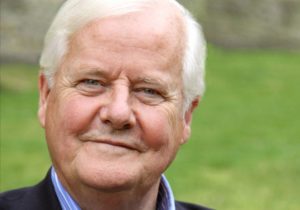
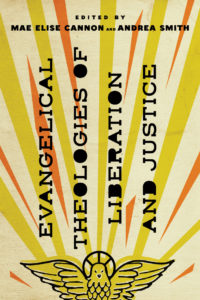 Evangelical Theologies of Liberation and Justice edited by Mae Elise Cannon & Andrea Smith (IVP Academic) $36.00 OUR SALE PRICE = $28.80. I know there are just dozens of wonderful, beautiful, powerful books on a Christian view of justice; Biblically-informed, deeply spiritual books to inspire us to care more about what God most cares about. God moved me to tears not long ago as I read out loud a few passages which link deep knowledge of the God of the Bible with the doing of justice and I was strangely warmed again, gladly. There was a time when one had to insist these verses were really in the Bible, so meager were most church people’s familiarity with the themes of justice in the Hebrew and Christian Scriptures. (I still return to Ron Sider’s Rich Christians in an Age of Hunger for a good overview.) Happily, we have moved deeper into the Biblical story these days and many of our best customers are looking for more detailed or more profound studies to equip them as agents of God’s peace and justice in this distorted, unfair world.
Evangelical Theologies of Liberation and Justice edited by Mae Elise Cannon & Andrea Smith (IVP Academic) $36.00 OUR SALE PRICE = $28.80. I know there are just dozens of wonderful, beautiful, powerful books on a Christian view of justice; Biblically-informed, deeply spiritual books to inspire us to care more about what God most cares about. God moved me to tears not long ago as I read out loud a few passages which link deep knowledge of the God of the Bible with the doing of justice and I was strangely warmed again, gladly. There was a time when one had to insist these verses were really in the Bible, so meager were most church people’s familiarity with the themes of justice in the Hebrew and Christian Scriptures. (I still return to Ron Sider’s Rich Christians in an Age of Hunger for a good overview.) Happily, we have moved deeper into the Biblical story these days and many of our best customers are looking for more detailed or more profound studies to equip them as agents of God’s peace and justice in this distorted, unfair world.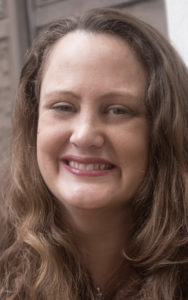
 As it becomes increasingly clear that the Christian right has no theology at all anymore, and moderate evangelicals remain pietistic with a personalized faith with little public square commitments, what theological work needs to happen to serve a Bible-centered, Christ-honoring, historically orthodox foundation for liberation, reconciliation, peace, creation-care, freedom and justice? This is the big project that Mae Cannon and Andrea Smith has taken up, bringing together some older and newer voices and it is a major project. There are amazing pieces in this handbook/anthology called Evangelical Theologies of Liberation and Justice — serious chapters on body shame, on animal liberation, chapters by thinkers of various ethnicities and social locations on how their own status shapes their understand of the Biblical hope. Wow, this is a wild and generative compilation! Kudos to the women editors, of course, and to their evangelical publisher for doing this kind of serious work for the overturning of death-dealing idols and the flourishing of the common good. We hope to get this in very soon, but the
As it becomes increasingly clear that the Christian right has no theology at all anymore, and moderate evangelicals remain pietistic with a personalized faith with little public square commitments, what theological work needs to happen to serve a Bible-centered, Christ-honoring, historically orthodox foundation for liberation, reconciliation, peace, creation-care, freedom and justice? This is the big project that Mae Cannon and Andrea Smith has taken up, bringing together some older and newer voices and it is a major project. There are amazing pieces in this handbook/anthology called Evangelical Theologies of Liberation and Justice — serious chapters on body shame, on animal liberation, chapters by thinkers of various ethnicities and social locations on how their own status shapes their understand of the Biblical hope. Wow, this is a wild and generative compilation! Kudos to the women editors, of course, and to their evangelical publisher for doing this kind of serious work for the overturning of death-dealing idols and the flourishing of the common good. We hope to get this in very soon, but the 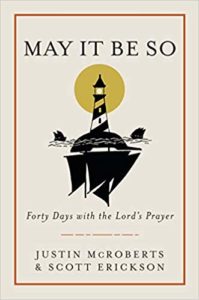 May It Be So: Forty Days with the Lord’s Prayer Justin McRoberts & Scott Erickson (Waterbrook) $16.99 OUR SALE PRICE = $13.59. I mentioned above that Dave Kinnaman describes the big Jubilee conference in Pittsburgh in his forthcoming Faith for Exiles. (He will be speaking there this February, so make plans now to attend! No matter where you live — come to Pittsburgh!) Justin McRoberts & Scott Erickson are two friends who have spent their share of time hanging out in the big book room at Jubilee and, in between speaking and painting and praying and playing music there (they are a talented duo) they cooked up a plan to collaborate on a book which would serve as a prompt to pray. Not exactly a book about praying nor exactly a book of prayers. The readings are nearly like Zen koans, I’ve said, Justin’s allusive and mystical and generous ruminations inspired by Scott the Painter’s very hip graphic designs. I suppose I’m not sure what came first, the pictures or the text, but somehow, they created our of that Jubilee vision an imaginative, remarkably useful, and very popular Prayer: Forty Days of Practice (Waterbrook; $16.99.) This book is one of those rare ones that they self-published — what they called their “Jubilee baby” (conceived as it was, right there in their conversations at the conference) — and it was so hugely well respected that a mainstream publisher picked it up, issuing it in an affordable hardback. This doesn’t happen often, folks, so it is an indication that it was a a very special book.
May It Be So: Forty Days with the Lord’s Prayer Justin McRoberts & Scott Erickson (Waterbrook) $16.99 OUR SALE PRICE = $13.59. I mentioned above that Dave Kinnaman describes the big Jubilee conference in Pittsburgh in his forthcoming Faith for Exiles. (He will be speaking there this February, so make plans now to attend! No matter where you live — come to Pittsburgh!) Justin McRoberts & Scott Erickson are two friends who have spent their share of time hanging out in the big book room at Jubilee and, in between speaking and painting and praying and playing music there (they are a talented duo) they cooked up a plan to collaborate on a book which would serve as a prompt to pray. Not exactly a book about praying nor exactly a book of prayers. The readings are nearly like Zen koans, I’ve said, Justin’s allusive and mystical and generous ruminations inspired by Scott the Painter’s very hip graphic designs. I suppose I’m not sure what came first, the pictures or the text, but somehow, they created our of that Jubilee vision an imaginative, remarkably useful, and very popular Prayer: Forty Days of Practice (Waterbrook; $16.99.) This book is one of those rare ones that they self-published — what they called their “Jubilee baby” (conceived as it was, right there in their conversations at the conference) — and it was so hugely well respected that a mainstream publisher picked it up, issuing it in an affordable hardback. This doesn’t happen often, folks, so it is an indication that it was a a very special book.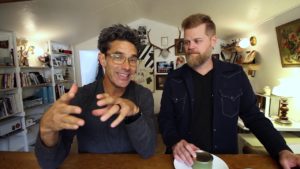
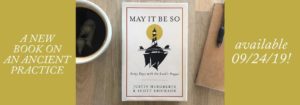
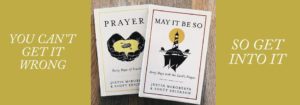
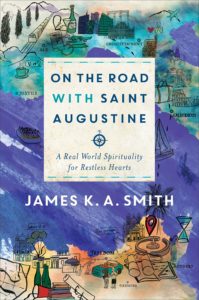 On the Road with Saint Augustine: A Real World Spirituality for Restless Hearts James K.A. Smith (Brazos Press) $24.99 OUR SALE PRICE = $19.99. With no disrespect for any of the other great authors and marvelous books coming out this fall, I think many in our circles will agree that this truly is one of the most highly anticipated and certainly will be one of the most significant spirituality books of the year. Those who followed Smith’s tour de force “Cultural Liturgies Project” comprising of three volumes (Desiring the Kingdom, Imagining the Kingdom, and Awaiting the Kingdom) or the one-volume, more accesible, You Are What You Love, you know of his affection for the great Saint Augustine from Northern Africa. Discipled by Ambrose on the mid-300s, Augustine became a Bishop, helping navigate the church’s role in a deteriorating Roman culture. How can those graciously swept up into the reign of God relate to the corrupt powers of this world? What does it look like in a world falling apart to be “in but not of?” Despite huge foibles and flaws, Augustine’s City of God shaped much Christian public theology and cultural engagement for centuries.
On the Road with Saint Augustine: A Real World Spirituality for Restless Hearts James K.A. Smith (Brazos Press) $24.99 OUR SALE PRICE = $19.99. With no disrespect for any of the other great authors and marvelous books coming out this fall, I think many in our circles will agree that this truly is one of the most highly anticipated and certainly will be one of the most significant spirituality books of the year. Those who followed Smith’s tour de force “Cultural Liturgies Project” comprising of three volumes (Desiring the Kingdom, Imagining the Kingdom, and Awaiting the Kingdom) or the one-volume, more accesible, You Are What You Love, you know of his affection for the great Saint Augustine from Northern Africa. Discipled by Ambrose on the mid-300s, Augustine became a Bishop, helping navigate the church’s role in a deteriorating Roman culture. How can those graciously swept up into the reign of God relate to the corrupt powers of this world? What does it look like in a world falling apart to be “in but not of?” Despite huge foibles and flaws, Augustine’s City of God shaped much Christian public theology and cultural engagement for centuries. And so, Jamie Smith takes seriously the adage that is said to be Augustinian: if you want to know what somebody is really like, don’t ask so much what they believe, but what they love. That is the power of his best-selling You Are What You Love as it reminded both modern day evangelicals and classic mainline denominational folks that dogma and doctrine and even talk of the allusive worldview doesn’t change people’s lives. The center of gravity of the human person is the heart, not the brain, and we must re-oriented our loves, our passions, our affections, note merely try to change minds. And that, as he explains brilliantly in the “Cultural Liturgy” trio and in You Are What You Love, happens through stories. We are conscripted into stories of the good life (or what is said to be the good live), and that often happens through habits and rituals. I won’t re-iterate it now, but that’s why Smith thinks that our hopes to deepen our discipleship in ways that shape us into the sorts of Christians who can faithfully engage the issues of the day and reform the society must start in deep and thoughtful worship of the Triune God. We are what we love, after all.
And so, Jamie Smith takes seriously the adage that is said to be Augustinian: if you want to know what somebody is really like, don’t ask so much what they believe, but what they love. That is the power of his best-selling You Are What You Love as it reminded both modern day evangelicals and classic mainline denominational folks that dogma and doctrine and even talk of the allusive worldview doesn’t change people’s lives. The center of gravity of the human person is the heart, not the brain, and we must re-oriented our loves, our passions, our affections, note merely try to change minds. And that, as he explains brilliantly in the “Cultural Liturgy” trio and in You Are What You Love, happens through stories. We are conscripted into stories of the good life (or what is said to be the good live), and that often happens through habits and rituals. I won’t re-iterate it now, but that’s why Smith thinks that our hopes to deepen our discipleship in ways that shape us into the sorts of Christians who can faithfully engage the issues of the day and reform the society must start in deep and thoughtful worship of the Triune God. We are what we love, after all.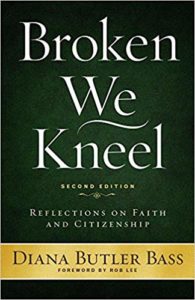 Broken We Kneel: Reflections on Faith and Citizenship (Second Edition)
Broken We Kneel: Reflections on Faith and Citizenship (Second Edition) religious right, either: everywhere we went we heard the drums of war. I admired that Diana — a historian and sociologist with theological training and a congregational, parish educator — was willing to risk her job, perhaps her reputation within her own denomination, to speak out against this warring madness (as the old hymn puts it.) “Broken We Kneel” seems a more faithful and honest and profound and Christ-like slogan, doesn’t it? Broken We Kneel explored her own experience within a church that didn’t quite agree and what it means to adopt this posture of peacemaking and Christian identity. It is a memoir of her season coming to grips with this civil religion stuff but it is also a guide for all of us. The new edition will have some updated chapters showing how this question is as lively and contemporary as ever.
religious right, either: everywhere we went we heard the drums of war. I admired that Diana — a historian and sociologist with theological training and a congregational, parish educator — was willing to risk her job, perhaps her reputation within her own denomination, to speak out against this warring madness (as the old hymn puts it.) “Broken We Kneel” seems a more faithful and honest and profound and Christ-like slogan, doesn’t it? Broken We Kneel explored her own experience within a church that didn’t quite agree and what it means to adopt this posture of peacemaking and Christian identity. It is a memoir of her season coming to grips with this civil religion stuff but it is also a guide for all of us. The new edition will have some updated chapters showing how this question is as lively and contemporary as ever.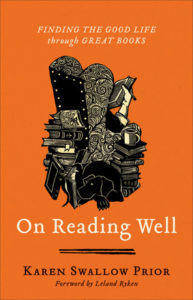 rehearse all that, but we have a whole section in the Dallastown shop which we call “books about books.” Serious literature criticism, memoirs about reading, and Christian arguments for reading widely abound. (I suppose you know we have often mentioned and featured Karen Swallow Prior’s lovely memoir of her own early years by way of the books she read, a great read called Booked: Literature in the Soul of Me and had her in the store last fall to do a presentation on her must-read book on character formation called On Reading Well: Finding the Good Life Through Great Books.
rehearse all that, but we have a whole section in the Dallastown shop which we call “books about books.” Serious literature criticism, memoirs about reading, and Christian arguments for reading widely abound. (I suppose you know we have often mentioned and featured Karen Swallow Prior’s lovely memoir of her own early years by way of the books she read, a great read called Booked: Literature in the Soul of Me and had her in the store last fall to do a presentation on her must-read book on character formation called On Reading Well: Finding the Good Life Through Great Books.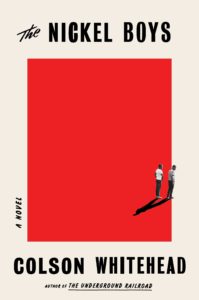 York theatre district (which Beth liked, even though it was fairly graphic in its description of sexuality, a racy feature some will not appreciate.) We feature important ones, especially, such as Barbara Kingsolver’s Unsheltered (which we both loved!) or the latest by award winning Moroccan-born, American novelist, Laila Lalami, The Other Americans, a crime novel revealing much about immigration, and, of course, the brand new (very, very heavy) The Nickel Boys by Colson Whitehead, who wrote last year’s amazingly well done, Pulitzer Prize Winner, The Underground Railroad (which is now out in paperback.) None of us have read it yet, and it may be too gruesome for some tastes, but
York theatre district (which Beth liked, even though it was fairly graphic in its description of sexuality, a racy feature some will not appreciate.) We feature important ones, especially, such as Barbara Kingsolver’s Unsheltered (which we both loved!) or the latest by award winning Moroccan-born, American novelist, Laila Lalami, The Other Americans, a crime novel revealing much about immigration, and, of course, the brand new (very, very heavy) The Nickel Boys by Colson Whitehead, who wrote last year’s amazingly well done, Pulitzer Prize Winner, The Underground Railroad (which is now out in paperback.) None of us have read it yet, and it may be too gruesome for some tastes, but 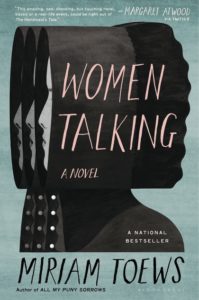 Do you know the work of Miriam Toews, a Canadian with a Mennonite past who writes socially engaged, serious fiction such as her recent Women Talking? It is about sexual abuse within strict Amish-like communities and gained some fame when none other than Margaret Atwood tweeted, “This amazing sad, shocking, but touching novel, based on a real-life event, could be right out of Handmaid’s Tale.” Another writer called it “an astonishment, a volcano of a novel…” and Laura Van Den Berg says it is a “flawless, ferocious work of art.”
Do you know the work of Miriam Toews, a Canadian with a Mennonite past who writes socially engaged, serious fiction such as her recent Women Talking? It is about sexual abuse within strict Amish-like communities and gained some fame when none other than Margaret Atwood tweeted, “This amazing sad, shocking, but touching novel, based on a real-life event, could be right out of Handmaid’s Tale.” Another writer called it “an astonishment, a volcano of a novel…” and Laura Van Den Berg says it is a “flawless, ferocious work of art.”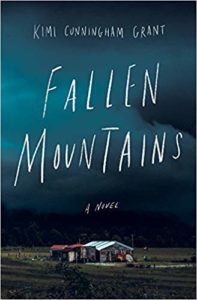 Fallen Mountain Kimi Cunningham Grant (Amberjack Publishing) $14.99 We were alerted to this indie press book by a good friend of ours, a discerning reader and good writer herself who is a friend of the author. (Hey, Erica Young Reitz, we even saw how you are thanked in the acknowledgments for helping the author think through the ending.) Ms Grant is a central Pennsylvania native and attended Messiah College. She has won numerous poetry awards and received a Pennsylvania Council on the Arts Fellowship grant, so is obviously a young writer to pay attention to. And she is, indeed, a good storyteller, has a way with words, and can craft good, good pages that draw out her characters. This slow, building plot set in the mountains of North Central PA.
Fallen Mountain Kimi Cunningham Grant (Amberjack Publishing) $14.99 We were alerted to this indie press book by a good friend of ours, a discerning reader and good writer herself who is a friend of the author. (Hey, Erica Young Reitz, we even saw how you are thanked in the acknowledgments for helping the author think through the ending.) Ms Grant is a central Pennsylvania native and attended Messiah College. She has won numerous poetry awards and received a Pennsylvania Council on the Arts Fellowship grant, so is obviously a young writer to pay attention to. And she is, indeed, a good storyteller, has a way with words, and can craft good, good pages that draw out her characters. This slow, building plot set in the mountains of North Central PA.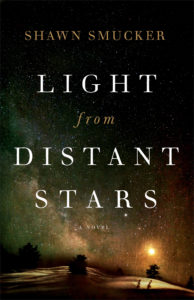 Light from Distant Stars Shawn Smucker (Baker) $14.99 I so badly want to explain what we like about this great new book, and have so much to say. Since the death of my mother, this book that opens in a funeral home and is largely about the relationship of a son and his deceased father, is more poignant for me than I knew when I started this review almost a month ago. I have carefully read this fascinating, entertaining, curious novel, written about it, erased it all, tried to re-write a better review, participated in a book release event party (sponsored by the author’s Lancaster friends The Row House Forum and Square Halo Gallery) and have pondered it over and over again. It means a lot to me this summer and we would be very happy if you ordered it from us so you can join in the buzz.
Light from Distant Stars Shawn Smucker (Baker) $14.99 I so badly want to explain what we like about this great new book, and have so much to say. Since the death of my mother, this book that opens in a funeral home and is largely about the relationship of a son and his deceased father, is more poignant for me than I knew when I started this review almost a month ago. I have carefully read this fascinating, entertaining, curious novel, written about it, erased it all, tried to re-write a better review, participated in a book release event party (sponsored by the author’s Lancaster friends The Row House Forum and Square Halo Gallery) and have pondered it over and over again. It means a lot to me this summer and we would be very happy if you ordered it from us so you can join in the buzz. For starters, as we have said before, Shawn Smucker is a fine writer, a friend of Hearts & Minds, and a truly decent guy; he received great acclaim for two very well-written YA fantasy novels (The Day the Angels Fell and The Edge of Over There that we have highly recommended) and an inspiring (dare I say necessary) memoir Once We Were Strangers about his friendship with a Syrian refugee in his hometown of Lancaster, PA. He’s co-written a few biographies too, so has been honing his artful writing chops since his days as a lit major in the good program at Messiah College.
For starters, as we have said before, Shawn Smucker is a fine writer, a friend of Hearts & Minds, and a truly decent guy; he received great acclaim for two very well-written YA fantasy novels (The Day the Angels Fell and The Edge of Over There that we have highly recommended) and an inspiring (dare I say necessary) memoir Once We Were Strangers about his friendship with a Syrian refugee in his hometown of Lancaster, PA. He’s co-written a few biographies too, so has been honing his artful writing chops since his days as a lit major in the good program at Messiah College.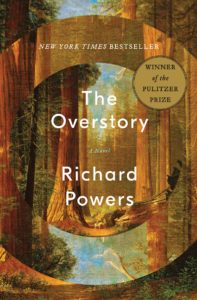 The Overstory Richard Powers (Norton) $18.95 Good friends who read a lot of contemporary fiction kept telling about this and we watched as some smart customers bought it and it was increasingly mentioned on literary blogs and appeared on “best of” lists in newspapers and journals all over the country. This was before it won the 2018 Pulitzer Prize. Beth eagerly picked it up this Spring and found it to be one of the most beautifully crafted works she has read in ages. She has a good eye for good writing and was so taken by some passages she put little Post-it notes on certain pages to read them out loud, later. What writing! What an artful, respected piece of modern fiction.
The Overstory Richard Powers (Norton) $18.95 Good friends who read a lot of contemporary fiction kept telling about this and we watched as some smart customers bought it and it was increasingly mentioned on literary blogs and appeared on “best of” lists in newspapers and journals all over the country. This was before it won the 2018 Pulitzer Prize. Beth eagerly picked it up this Spring and found it to be one of the most beautifully crafted works she has read in ages. She has a good eye for good writing and was so taken by some passages she put little Post-it notes on certain pages to read them out loud, later. What writing! What an artful, respected piece of modern fiction.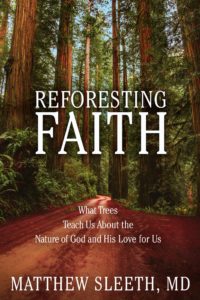 Evangelical MD turned environmentalist Matthew Sleeth recently wrote Reforesting Faith: What Trees Can Teach Us About God and if you’re not up for Mr. Power’s strikingly imaginative story about trees, read Sleeth, first, and then read Overstory. Or, if you find the beauty and power of a fictional story about trees and greed and conflict and life and death to be deeply compelling, then read Power’s novel first, then the non-fiction Reforesting Faith next.) In any event Richard Powers is a gifted writer, an astonishing storyteller, and his drama is thick and engaging. It’s a beauty of a book.
Evangelical MD turned environmentalist Matthew Sleeth recently wrote Reforesting Faith: What Trees Can Teach Us About God and if you’re not up for Mr. Power’s strikingly imaginative story about trees, read Sleeth, first, and then read Overstory. Or, if you find the beauty and power of a fictional story about trees and greed and conflict and life and death to be deeply compelling, then read Power’s novel first, then the non-fiction Reforesting Faith next.) In any event Richard Powers is a gifted writer, an astonishing storyteller, and his drama is thick and engaging. It’s a beauty of a book.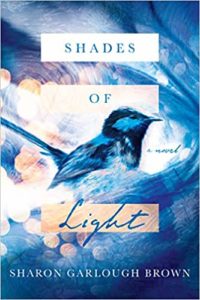 Shades of Light Sharon Garlough Brown IVP) $18.00 I have written about this before and a few interested customers were eager to pre-order it. We just got it into the store last week, a bit ahead of the scheduled mid-August release, and we’ve sent it out to those who have already ordered it. You may recall that I touted it as a realistic spiritual story that moved me, surprisingly so.
Shades of Light Sharon Garlough Brown IVP) $18.00 I have written about this before and a few interested customers were eager to pre-order it. We just got it into the store last week, a bit ahead of the scheduled mid-August release, and we’ve sent it out to those who have already ordered it. You may recall that I touted it as a realistic spiritual story that moved me, surprisingly so.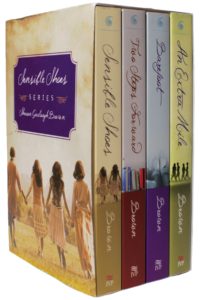 These four “Sensible Shoes” novels (each published by IVP) are a delight because there isn’t much popular storytelling about those sorts of topics or characters who take up intentional spiritual practices.
These four “Sensible Shoes” novels (each published by IVP) are a delight because there isn’t much popular storytelling about those sorts of topics or characters who take up intentional spiritual practices. My Dearest Dietrich: A Novel of Dietrich Bonhoeffer’s Lost Love Amanda Barratt (Kregel) $21.99 This is a brand new novel that I just had to mention even though we have not yet read it. There have been a few other authors brave enough to create a novel set in World War II era Germany, using that backdrop to explore, in fictional storytelling, what it might have been like to be romantically involved with Dietrich Bonhoeffer during the years of his underground seminary and resistance to National Socialism and Hitler. We have letters from him during those years of his imprisonment starting on February 7, 1945, the day after he turned 39 when he was transferred from his prison in Berlin to Buchenwald to Regensburg to Flossenburg.
My Dearest Dietrich: A Novel of Dietrich Bonhoeffer’s Lost Love Amanda Barratt (Kregel) $21.99 This is a brand new novel that I just had to mention even though we have not yet read it. There have been a few other authors brave enough to create a novel set in World War II era Germany, using that backdrop to explore, in fictional storytelling, what it might have been like to be romantically involved with Dietrich Bonhoeffer during the years of his underground seminary and resistance to National Socialism and Hitler. We have letters from him during those years of his imprisonment starting on February 7, 1945, the day after he turned 39 when he was transferred from his prison in Berlin to Buchenwald to Regensburg to Flossenburg.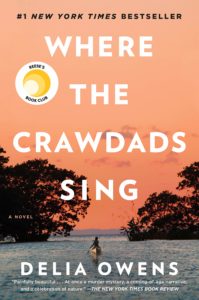 Where the Crawdads Sing Delia Owens (Putnam) $26.00 I mentioned this in passing, above, as it has been riding at the top (or near the top) of all the standard best-seller lists and is hugely popular this summer. It has sold more than 2 million copies (in part due to its choice as a “Reese’s Book Club” selection. (That Reese Witherspoon has very good Southern taste, I must say!)
Where the Crawdads Sing Delia Owens (Putnam) $26.00 I mentioned this in passing, above, as it has been riding at the top (or near the top) of all the standard best-seller lists and is hugely popular this summer. It has sold more than 2 million copies (in part due to its choice as a “Reese’s Book Club” selection. (That Reese Witherspoon has very good Southern taste, I must say!)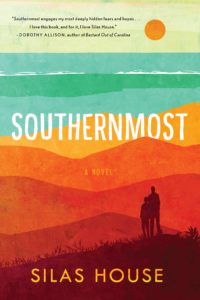 Southernmost Silas House (Algonquin Books) $15.95 This publisher is renowned for good, classy, meaty (Southern) stories, and this one just released in paperback – called “bracing, honest, and luminous” — is no exception. The fictional Asher Sharp is an evangelical preacher who is, as it says on the back cover, “willing to give up everything for what he believes in. Except his son.”
Southernmost Silas House (Algonquin Books) $15.95 This publisher is renowned for good, classy, meaty (Southern) stories, and this one just released in paperback – called “bracing, honest, and luminous” — is no exception. The fictional Asher Sharp is an evangelical preacher who is, as it says on the back cover, “willing to give up everything for what he believes in. Except his son.”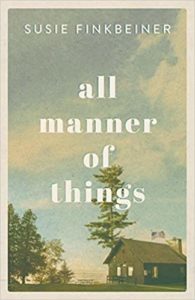 All Manner of Things Susie Finkbeiner (Revell) $15.99 I think the simple cover and the curious title (hasn’t that ever been used as a book title before?) first struck me, as did the imagination-capturing blurb from Jocelyn Green, a Christy Award-winning author of Between Two Shores, who wrote, “Some books are meant to be read. All Manner of Things is meant to be lived in.” If the characters are real and the story important, this quote is a huge invitation, eh?
All Manner of Things Susie Finkbeiner (Revell) $15.99 I think the simple cover and the curious title (hasn’t that ever been used as a book title before?) first struck me, as did the imagination-capturing blurb from Jocelyn Green, a Christy Award-winning author of Between Two Shores, who wrote, “Some books are meant to be read. All Manner of Things is meant to be lived in.” If the characters are real and the story important, this quote is a huge invitation, eh?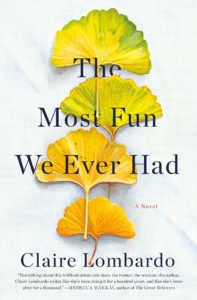 The Most Fun We Ever Had Claire Lombardo (Doubleday) $28.95 Okay, I’ll admit it. I got this into our store mostly because I loved the cover. And I read a fabulous review. (But mostly the cover.) Some people just love holding this kind of a big, thick, novel — I recently ordered for myself another hardcover copy of Elizabeth Gilbert’s splendid The Signature of All Things just because such a sprawling, epic, wondrous novel deserves a material heft in the hand to match the story. The Most Fun We Ever Had, a debut novel with amazing endorsements from the likes of Richard Russo and Affinity Konar, despite the cheery title, just seems to deserve this good, fat, 500 page volume. It’s apparently an ambitious, sprawling, multi-generational novel about the life-long friendship of four sisters and their respective families. The Guardian said it could be the “literary love child of Jonathan Franzen and Anne Tyler.” Ha.
The Most Fun We Ever Had Claire Lombardo (Doubleday) $28.95 Okay, I’ll admit it. I got this into our store mostly because I loved the cover. And I read a fabulous review. (But mostly the cover.) Some people just love holding this kind of a big, thick, novel — I recently ordered for myself another hardcover copy of Elizabeth Gilbert’s splendid The Signature of All Things just because such a sprawling, epic, wondrous novel deserves a material heft in the hand to match the story. The Most Fun We Ever Had, a debut novel with amazing endorsements from the likes of Richard Russo and Affinity Konar, despite the cheery title, just seems to deserve this good, fat, 500 page volume. It’s apparently an ambitious, sprawling, multi-generational novel about the life-long friendship of four sisters and their respective families. The Guardian said it could be the “literary love child of Jonathan Franzen and Anne Tyler.” Ha.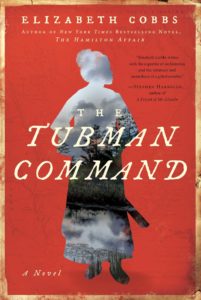 The Tubman Command Elizabeth Cobbs (Arcade) $25.99 If you follow serious historical fiction you may know of Cobbs for her best-selling novel, The Hamilton Affair. Here she offers a fictionalized account of a lesser known event in American history, the time in May 1863 when the demoralized Union Army (having suffered fresh losses at the Battle of Chancellorsville and Fort Sumter stood to taunt the American Navy) recruited a woman with the code-name Moses. You know this is the heroic (and by that time, hunted by the Confederates) Harriet Tubman.
The Tubman Command Elizabeth Cobbs (Arcade) $25.99 If you follow serious historical fiction you may know of Cobbs for her best-selling novel, The Hamilton Affair. Here she offers a fictionalized account of a lesser known event in American history, the time in May 1863 when the demoralized Union Army (having suffered fresh losses at the Battle of Chancellorsville and Fort Sumter stood to taunt the American Navy) recruited a woman with the code-name Moses. You know this is the heroic (and by that time, hunted by the Confederates) Harriet Tubman.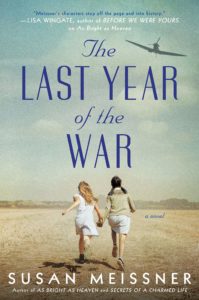 The Last Year of the War Susan Meissner (Berkley) $26.00 I wanted to list this since it is one Beth found very engaging and very entertaining. It is a beautifully poignant novel, with what one reviewer said “explores the complexities of love, friendship, and the fleeting truths of identity.” The prose is truly lovely, even if it highlights a dark aspect of our culture and a sad time in American history.
The Last Year of the War Susan Meissner (Berkley) $26.00 I wanted to list this since it is one Beth found very engaging and very entertaining. It is a beautifully poignant novel, with what one reviewer said “explores the complexities of love, friendship, and the fleeting truths of identity.” The prose is truly lovely, even if it highlights a dark aspect of our culture and a sad time in American history.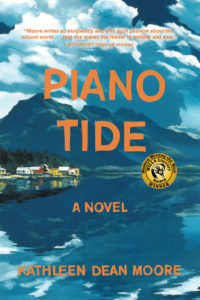 Piano Tide Kathleen Dean Moore (Counterpoint) $16.95 This is not a brand new novel, but we somehow had missed it, even though it was written by a memoirist and nature writer that I adore. I’ve read several of Moore’s beautiful non-fiction works (such as Pine Island Paradox and Holdfast and Wild Comfort: The Solace of Nature.) Her recent polemic is important and passionate, called Great Tide Rising: Towards Clarity and Moral Courage in a Time of Planetary Change. We stock them all, of course. I had completely missed that this philosophy professor and mom and ecologist and climate change activist had tried her hand at a novel. She’s such a good writer that I figured we should carry it.
Piano Tide Kathleen Dean Moore (Counterpoint) $16.95 This is not a brand new novel, but we somehow had missed it, even though it was written by a memoirist and nature writer that I adore. I’ve read several of Moore’s beautiful non-fiction works (such as Pine Island Paradox and Holdfast and Wild Comfort: The Solace of Nature.) Her recent polemic is important and passionate, called Great Tide Rising: Towards Clarity and Moral Courage in a Time of Planetary Change. We stock them all, of course. I had completely missed that this philosophy professor and mom and ecologist and climate change activist had tried her hand at a novel. She’s such a good writer that I figured we should carry it.